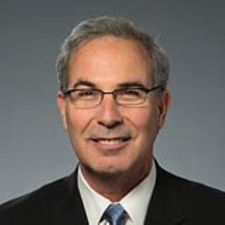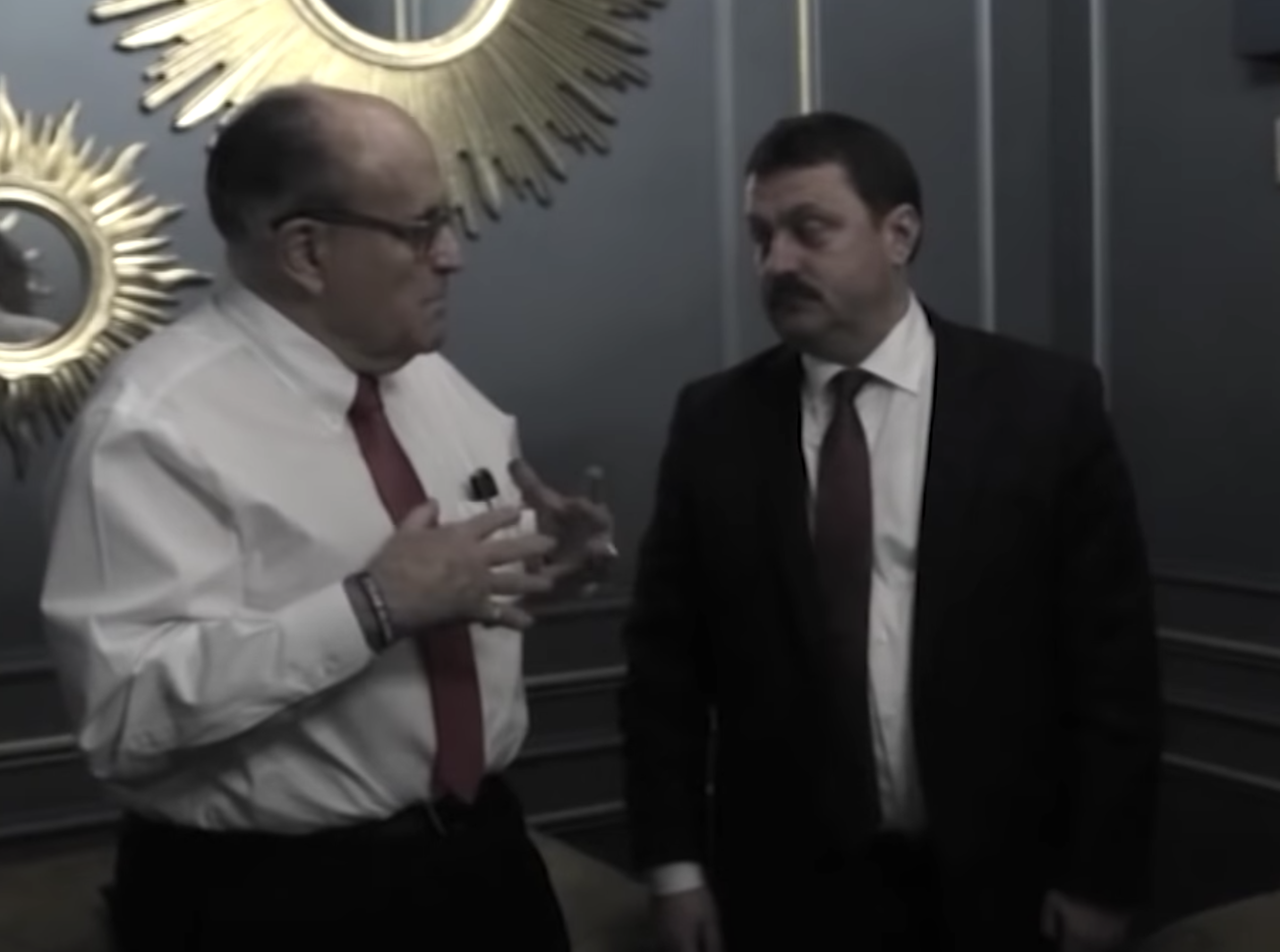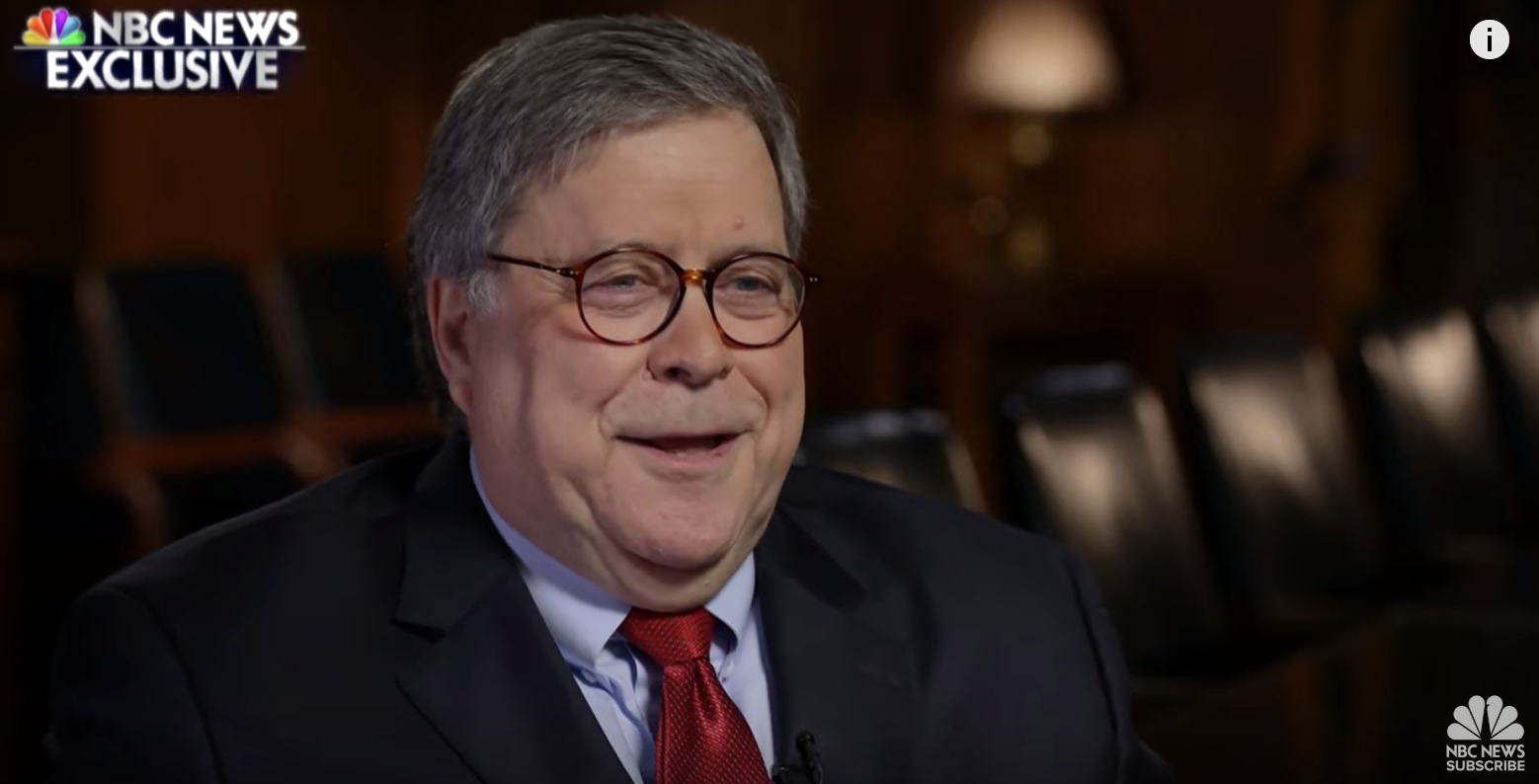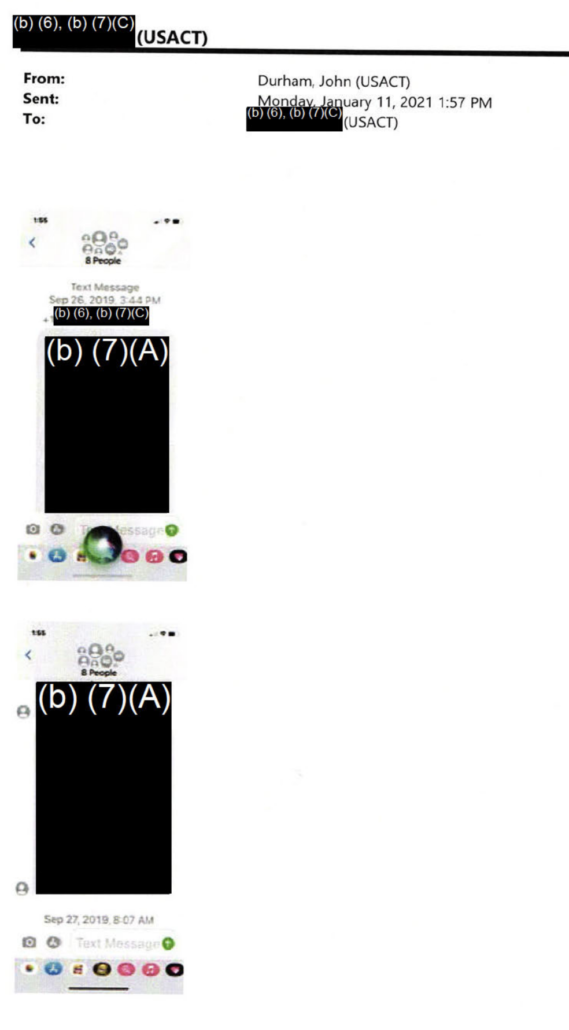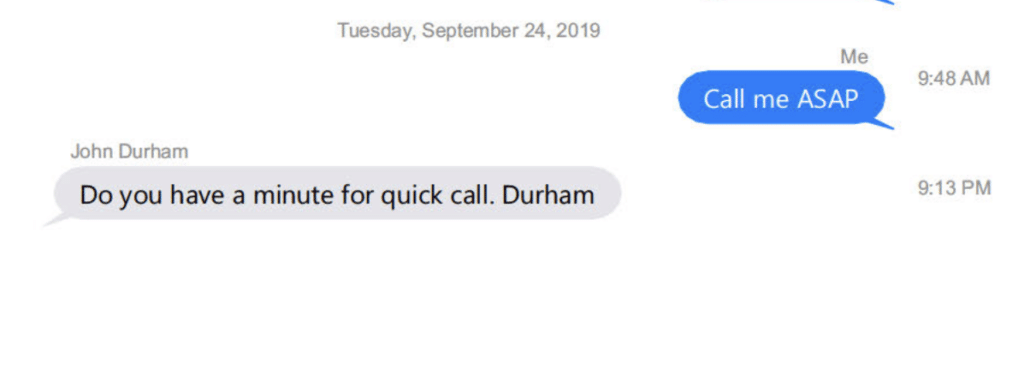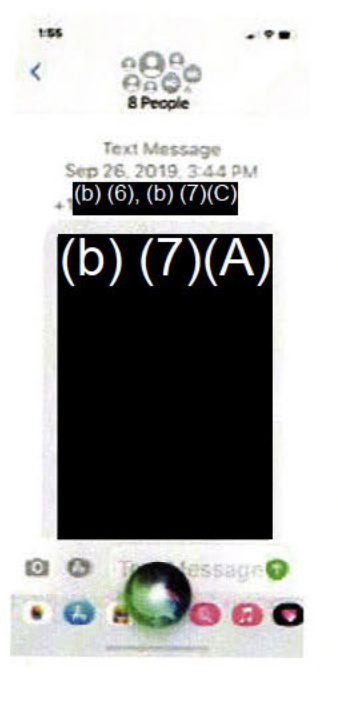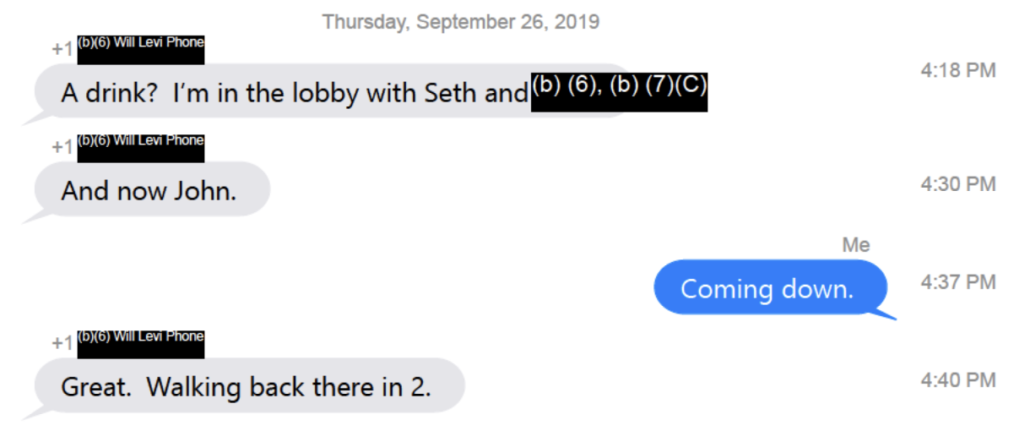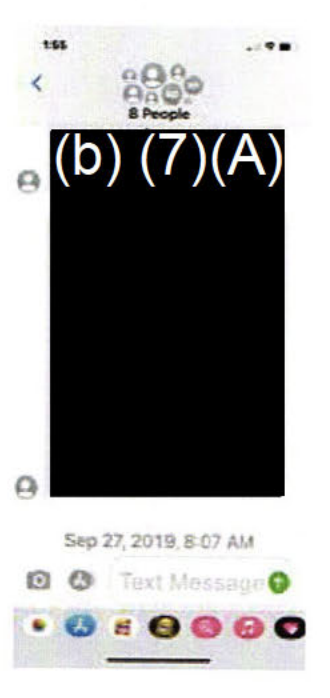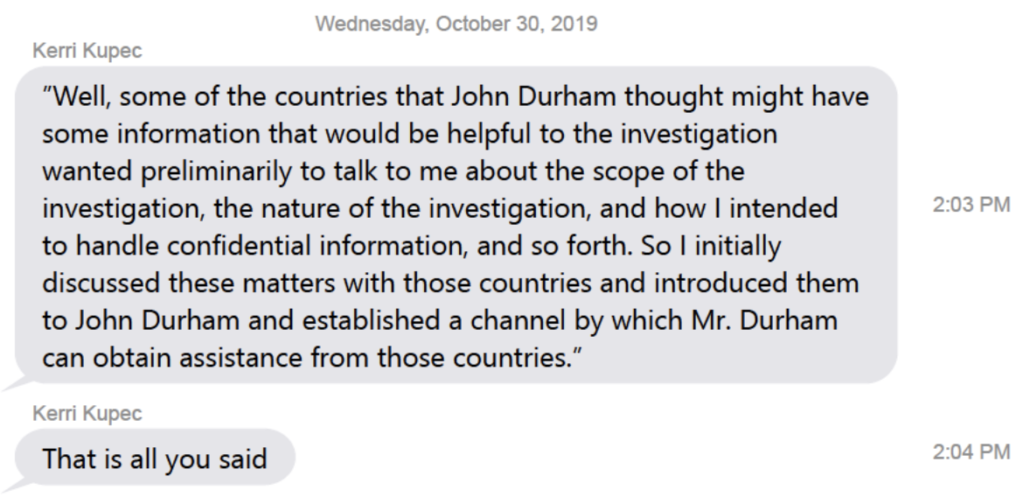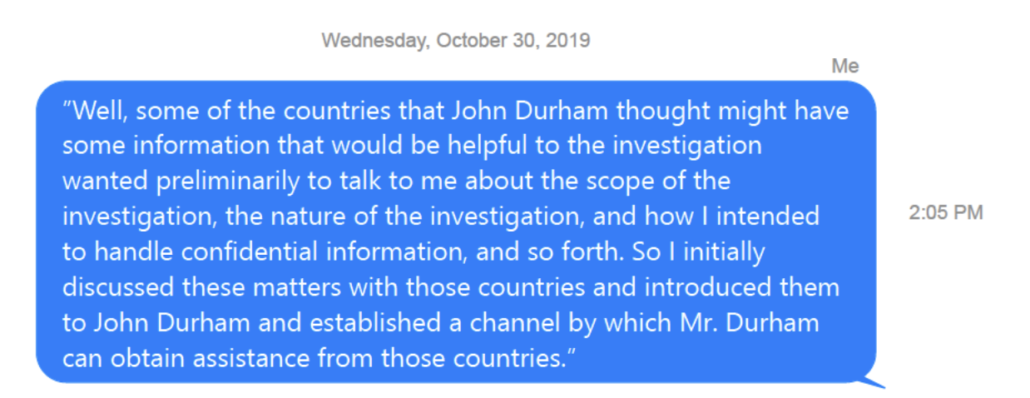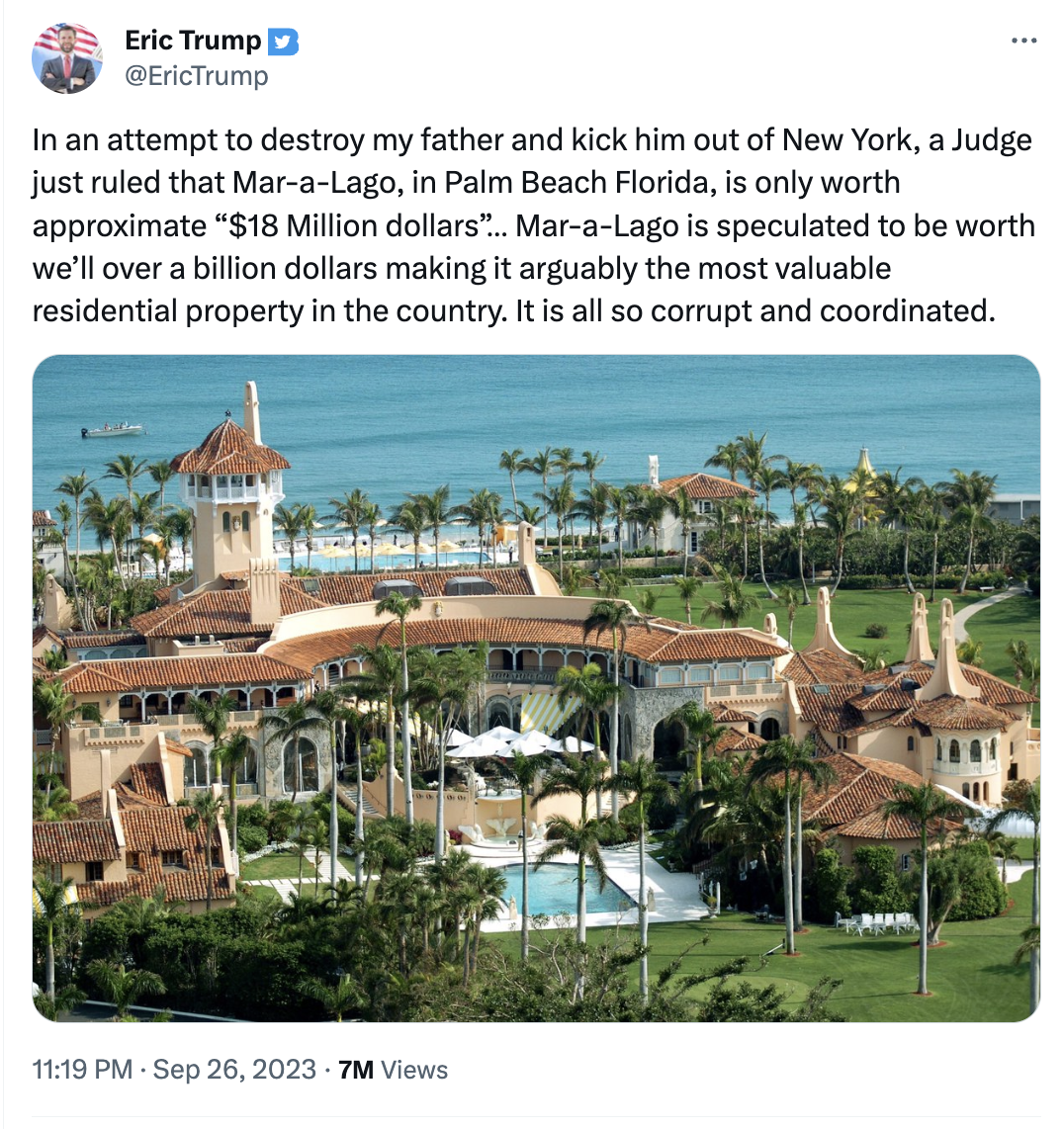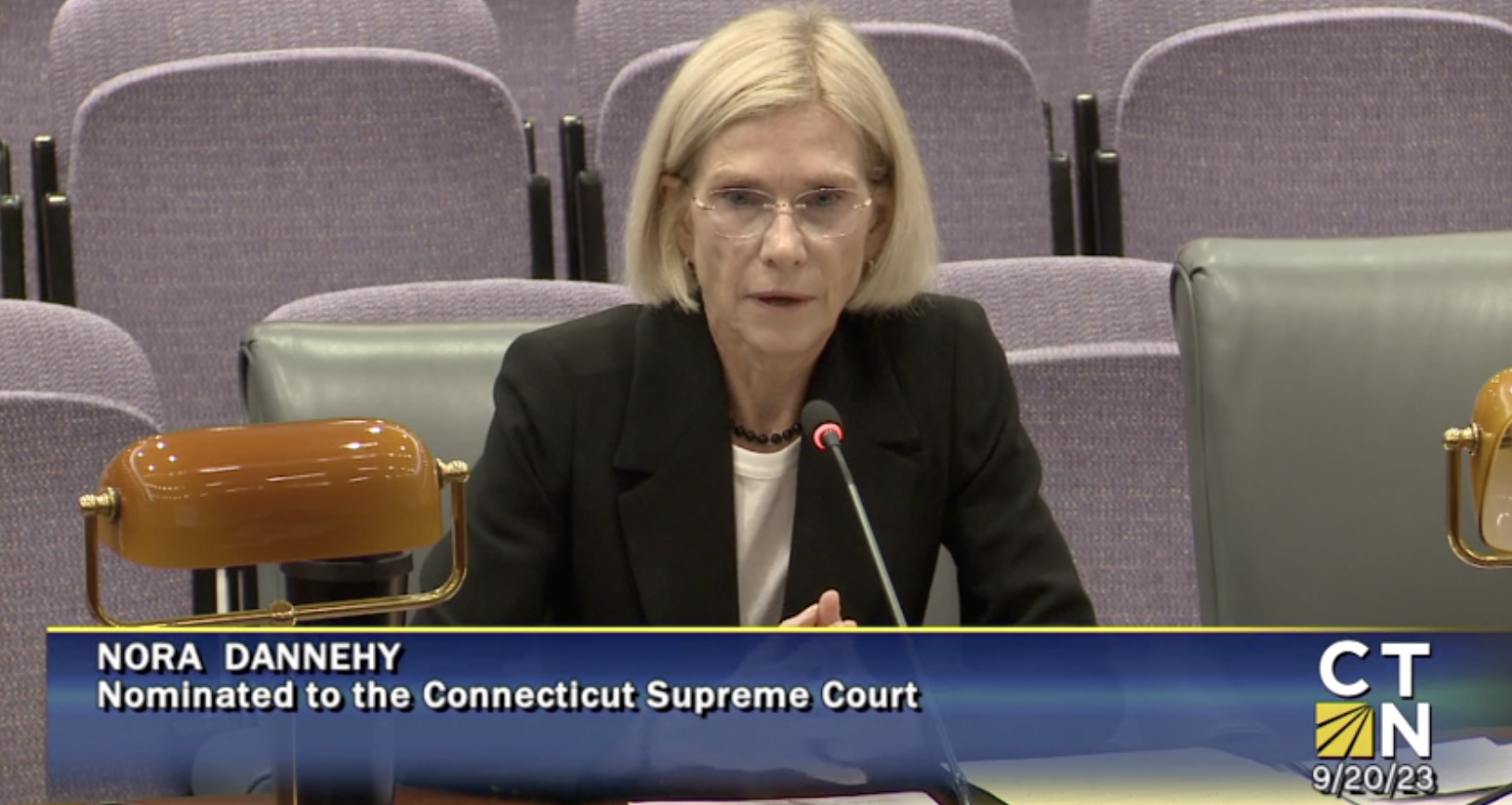Garanimals in a SCIF: David Weiss’ Attempt to Sheep Dip Bill Barr’s Hunter Biden Prosecution
On July 11, 2023, David Weiss’ First AUSA Shannon Hanson responded to an inquiry from Judge Maryanne Noreika’s courtroom deputy, Mark Buckson. He wanted to know when “the final versions of the documents” pertaining to the Hunter Biden plea deal would be completed. Hanson responded within five minutes. Before she explained that she didn’t know when they’d have the final documents, but hoped to have them to Judge Noreika by Thursday (so July 13), she described that, “I will be speaking with the team later today (I understand they are in a secure location and cannot readily be contacted at the moment.”
Hanson was describing “the team” — she had cc’ed Delaware AUSA Benjamin Wallace and Baltimore AUSAs Leo Wise and Derek Hines — as something of which she was not a part. And she was describing that team as being in a SCIF.
Hunter Biden’s attorneys included the email with their motion to dismiss based on an argument that the diversion agreement Hunter signed prohibits the indictment charging him with three gun charges. The email shows that the final documents filed with the court on July 20, by Wallace, had just one change from the version submitted on June 8, by Hanson. Wallace explained:
The parties and Probation have agreed to revisions to the diversion agreement to more closely match the conditions of pretrial release that Probation recommended in the pretrial services report issued yesterday.
Hunter’s team submitted it to show that, following the Probation Office’s recommendation of Hunter for diversion on July 19, the parties submitted it as a finished agreement.
This motion makes a strong argument that the government entered into an agreement with Hunter for which he sacrificed his rights — including by allocuting to the facts regarding the gun purchase — and therefore must honor the contractual protections it offered to get Hunter to sacrifice those rights.
Indeed, in a footnote it goes further than that: it argues that because the immunity agreement language was in the gun diversion, all the charges tied to the informations that were before Noreika are barred, including the tax charges filed in California.
7 Although the only charges now before the Court are the gun charges in the prosecution’s lone Indictment of Mr. Biden in this District, Mr. Biden notes that the sweeping immunity of the Diversion Agreement would seem to bar any plausible charge that could be brought against him (including the recently filed tax charges in California). The only charges that are not be barred by the immunity provision are those filed in the pre-existing Informations filed against him in this District. The Diversion Agreement called for the eventual dismissal of the gun charge Information upon the conclusion of the diversion period, but the prosecution already has dismissed it. Although the Plea Agreement was not accepted on the misdemeanor tax charge Information, the prosecution has dismissed that Information as well. Consequently, the Diversion Agreement’s immunity for gun and tax-related charges would bar any similar charge from now being filed. This sweeping immunity may make it difficult for the prosecutors to appease Mr. Trump and the Republican congressmen who have criticized them, but this is the deal that the prosecutors made and it reflects their choice to place the immunity provision in the Diversion Agreement.
I’m less certain that’ll fly, but it’s a hint of where things are headed in California.
That’s what the documents show with regards to the motion to dismiss, which I’ve always said is probably Hunter’s best argument to have the indictment dismissed.
But the documents are as interesting for what they show of David Weiss’ attempt to sheep dip this prosecution — to give it a virgin birth under the direction of now-Principal Senior Assistant Special Counsel Leo Wise or, as Joseph Ziegler’s attorney described it when he invited the disgruntled IRS agent to explain how irreplaceable he was, to replace one Garanimal with another.
Mr. Zerbe. I want to make sure — you made one point. I think you need to clarify it for him. He asked if the case is going forward. I think for everybody here, explain though that it’s not just kind of Garanimals where they can swap you in and out. Talk about, you not being on the case, you have to put somebody in new, but kind of how that impacts. I just want you to understand that.
Mr. [Ziegler]. So what’s frustrating — and I think it’s obvious is he removed two of the people who have been challenging and been kind of like this is the — we’re trying to do the right thing, we’re trying to do the right thing. And it was kind of like we got loud enough, and they found an avenue to remove us. I have been told by so many people on this case that we’re where we are today because of my work. It’s 5 years of an investigation. You can’t just pick up that and move it onto someone else. And if they removed all the prosecutors, DOJ Tax, and had a brand-new team, I would understand that completely if that’s the decision that they made. But they just removed us.
Ziegler made that comment on June 1. And he was right, at that point — as he sat in a room making claims about Lesley Wolf’s conduct that documents he himself released almost four months later would substantially debunk — that “they” had not yet “removed all the prosecutors.” But they would, within days.
As Chris Clark described in his declaration describing plea negotiations, that same day, June 1, Lesley Wolf invited Clark to come to the US Attorney’s Office the next day to work on the plea agreement, in part so they could share language with David Weiss in real time.
20. On June 1, 2023, AUSA Wolf sent me an email inviting me to meet at the U.S. Attorney’s Office in Wilmington on June 2 to work together on the agreements’ specific language and provisions. The idea was for the AUSAs and defense counsel to be in the same room with access to U.S. Attorney Weiss, so that the terms could be worked out. A true and correct copy of AUSA Wolf’s June 1, 2023, email to Chris Clark is attached hereto as Exhibit H.
21. On June 2, 2023, co-counsel Matthew Salerno and I went to the U.S. Attorney’s Office in Wilmington, where the USAO presented us with its draft of a new Diversion Agreement, along with a draft Plea Agreement. This was the first time that we had seen the USAO’s draft Agreements. Each draft Agreement was accompanied by a broad and lengthy Statement of Facts, each of which had been drafted solely by the USAO in advance of the June 2 meeting. At this meeting, AUSA Wolf expressed the view that it was in Mr. Biden’s interest to have broad Statements of Facts included because the scope of immunity (under Paragraph 15 of the Diversion Agreement) would be tied to the Statements of Facts. The Agreement included a more limited immunity provision than I had discussed with AUSA Wolf or that Mr. Biden would accept. Among the revisions, during or shortly after that June 2 meeting, references to tax liability for years 2016 and 2019 were specifically added to the Plea Agreement’s Statement of Facts.
22. The AUSAs and we took turns working on the specific language of each Agreement—with AUSA Wolf running the changes by Office leadership, including U.S. Attorney Weiss. No final agreement was reached that day, and the meeting concluded with the AUSAs agreeing that the USAO would work on composing acceptable language on an immunity provision.
23. That same evening (Friday June 2), at or around 9:43 PM EST, I emailed AUSA Wolf, copying my co-counsel, and proposed one revision to Paragraph 15 of the Diversion Agreement (the provision governing immunity): that Paragraph 15 provide that “The United States agrees not to criminally prosecute Biden, outside the terms of this Agreement, for any federal crimes arising from the conduct generally described in the attached Statement of Facts (attachment A) and the Statement of Facts attached as Exhibit 1 to the Memorandum of Plea Agreement filed this same day.” (Emphasis added.) In the email, I advised AUSA Wolf that it was “very critical for us” that the Diversion Agreement include “[t]his language or its functional equivalent.” A true and correct copy of Chris Clark’s June 2, 2023, email to AUSA Wolf, copying co-counsel, is attached hereto as Exhibit I. [emphasis original]
Wolf was still on the team when — after Clark spoke with Weiss directly on June 6 about the importance of protecting Hunter from any further legal exposure — she sent Clark new language seemingly addressing Clark’s concerns about the immunity language.
28. After extensive discussion with AUSA Wolf in which she repeatedly stated that U.S. Attorney Weiss was unwilling to revise the language of the Agreement’s immunity provision, I conveyed that if this language could not be revised, we would not have a deal and that it was the most important term in the Agreement that Mr. Biden get finality. Accordingly, I requested to speak directly with U.S. Attorney Weiss, whom I was told was the person deciding the issues of the Agreement. Later that afternoon, on June 6, 2023, I spoke directly with U.S. Attorney Weiss. During that call, I conveyed to U.S. Attorney Weiss that the Agreement’s immunity provision must ensure Mr. Biden that there would be finality and closure of this investigation, as I had conveyed repeatedly to AUSA Wolf during our negotiations. I further conveyed to U.S. Attorney Weiss that this provision was a deal-breaker. I noted that U.S. Attorney Weiss had changed the deal several times heretofore, and that I simply could not have this issue be yet another one which Mr. Biden had to compromise. The U.S. Attorney asked me what the problem was with the proposed language, and I explained that the immunity provision must protect Mr. Biden from any future prosecution by a new U.S. Attorney in a different administration. The U.S. Attorney considered the proposal and stated that he would get back to me promptly.
29. Later that same evening on June 6, 2023, at or around 5:47 PM EST, AUSA Wolf emailed me proposed language for the immunity provision that read: “How about this- The United States agrees not to criminally prosecute Biden, outside of the terms of this Agreement, for any federal crimes encompassed by the attached Statement of Facts (Attachment A) and the Statement of Facts attached as Exhibit 1 to the Memorandum of Plea Agreement filed this same day.” (Emphasis in original.) After speaking with Mr. Biden, I responded to AUSA Wolf that the language she sent me “works” and is suitable for Mr. Biden as well, at which point the Parties had a deal. A true and correct and correct copy of AUSA Wolf’s June 6, 2023, email to Chris Clark is attached hereto as Exhibit K. [all emphasis in Clark’s declaration]
And Wolf was still on the team on June 8, the day when the documents were first filed with the court.
That is, Wolf was still on the team when Jim Jordan and Bill Barr had already intervened in the case.
Wolf was still on the prosecutorial team — and negotiating a plea deal that would have ruled out FARA charges — on June 7.
That’s the same day Weiss sent the first response, to a May 25 letter Jim Jordan sent Merrick Garland about the IRS agents’ complaints of being removed from the investigation. In it, he cited Rod Rosenstein’s explanation to Chuck Grassley in 2018 how congressional interference might politicize an investigation (in that case, the Mueller investigation).
The information sought by the Committee concerns an open matter about which the Department is not at liberty to respond. As then-Deputy Attorney General Rod Rosenstein wrote in 2018 in response to a request for information from the Honorable Charles Grassley, Chairman of the Senate Committee on the Judiciary:
Congressional inquiries during the pendency of a matter pose an inherent threat to the integrity of the Department’s law enforcement and litigation functions. Such inquiries inescapably create the risk that the public and the courts will perceive undue political and Congressional influence over law enforcement and litigation decision.
[snip]
Weiss might claim that he replaced Wolf with Wise and in the process had Wise reassess the prior prosecutorial decisions. But, given the date of that letter, there was never a moment he had done so before the political pressure started. David Weiss cannot claim he did so before being pressured by Jim Jordan.
And Jordan’s letter wasn’t the only political pressure. On the same day that Weiss said he couldn’t share information — the likes of which Shapley had already started sharing — because it might politicize an ongoing investigation, Bill Barr (one of the people Lowell wants to subpoena) publicly intervened in the case, insisting the FD-1023 recording Mykola Zlochevsky making a new allegation of bribery had been a live investigative lead when it was shared with Weiss in October 2020, the FD-1023 Weiss specifically said he could not address because it was part of an ongoing investigation.
On a day when Lesley Wolf remained on the case, both Jordan and Barr had already intervened. And because there was never a time that Weiss had replaced Wolf with Wise before the political pressure started, there was little time he had done so before the physical threats followed the political pressure.
But June 8 — the day the plea deal first got shared with the court — was the last day that Lesley Wolf shows up in Clark’s timeline.
She wasn’t removed for misconduct. In his testimony to the House Judiciary Committee, Weiss agreed that Wolf, “did her work on the Hunter Biden matter in a professional and unbiased manner without partisan or political considerations.” He said,
I believe she did. As I said, she served the Department for more than 16 years, and I believe her to be a prosecutor with integrity.
But per Michael Batdorf, she was, nevertheless, replaced.
On June 19, Principal Senior Assistant Special Counsel Leo Wise made his first appearance. Joseph Ziegler, a disgruntled IRS agent spreading false hearsay claims, succeeded in getting Wolf replaced.
That same day, June 19, Hanson requested that Clark modify the statement he was going to release. But, in a phone call, she told him that there was no pending investigation against Hunter Biden.
35. On June 19, 2023, at 2:53 PM EST, after I had a phone call with AUSA Hanson indicating I would do so, I emailed AUSA Hanson a proposed press statement to accompany the public release of both Informations that read, in part, “I can confirm that the five-year long, extensive federal investigation into my client, Hunter Biden, has been concluded through agreements with the United States Attorney’s Office for the District of Delaware.” (Emphases added.) A true and correct copy of Chris Clark’s June 19, 2023, email to AUSA Hanson is attached hereto as Exhibit P.
36. Shortly after that email, I had another phone call with AUSA Hanson, during which AUSA Hanson requested that the language of Mr. Biden’s press statement be slightly revised. She proposed saying that the investigation would be “resolved” rather than “concluded.” I then asked her directly whether there was any other open or pending investigation of Mr. Biden overseen by the Delaware U.S. Attorney’s Office, and she responded there was not another open or pending investigation. Thereafter, at 4:18 PM EST that day, I sent AUSA Hanson a revised statement that read: “With the announcement of two agreements between my client, Hunter Biden, and the United States Attorney’s Office for the District of Delaware, it is my understanding that the five-year investigation into Hunter is resolved.” (Emphases added.) The new statement revised the language from “concluded” to “resolved,” a stylistic change that meant the same thing. A true and correct copy of Chris Clark’s June 19, 2023, email to AUSA Hanson is attached hereto as Exhibit Q [Clark’s italics, my bold]
I hope to hell Clark has notes of that conversation, because the assertion that there was no pending investigation of Hunter Biden on June 19 directly conflicts with a claim that David Weiss made to the House Judiciary Committee.
On November 7, David Weiss repeated a claim his office made when they first announced the deal: that it was ongoing. “I can say that at no time was it coming to a close,” Weiss told the House Judiciary Committee. “I think, as I stated in the one statement I made at the time … the investigation was continuing. So it wasn’t ending there in any event.”
That is, Weiss’ First AUSA, Shannon Hanson, allegedly told Clark something that directly conflicts with something Weiss said to Congress.
That may be why Abbe Lowell, while arguing that no hearing is necessary to dismiss the indictment based on the contract that existed between the government and Hunter Biden, said that if Judge Noreika thinks she does need a hearing, then to please have David Weiss prepared to testify as a witness.
If the Court believes that parol evidence should be considered, Mr. Biden requests an evidentiary hearing in which all participants in the negotiation of the Diversion Agreement, including Mr. Weiss and the responsible members of his prosecution team, can be called as witnesses to address the extensive recapitulation provided in Mr. Clark’s Declaration.
It’s going to be a lot harder for Weiss to claim that US Attorneys-turned-Special Counsels can’t testify when he was willing to testify to Congress.
This is undoubtedly why Lowell asked to be able to subpoena Bill Barr’s communications, through the present, about the Hunter Biden investigation — a version of which he made in formal discovery as well (Lowell also noted Barr’s recent comments on the investigation in the selective and vindictive prosecution MTD). Because Bill Barr intervened in this case before such time as Wolf was apparently removed and replaced by Principal Senior Assistant Special Counsel Leo Wise. Barr intervened publicly, and given Wise’s concerns about DOJ materials in the possession of former DOJ employees in his response to that subpoena request, it seems acutely likely that Weiss recognizes that Barr intervened in a way that shared privileged information.
Likewise, specific regulations govern the disclosure of DOJ materials in the possession of former DOJ employees, and the government is unable to assess the applicability or propriety of disclosure without identification of the specific documents. See 28 C.F.R. § 16.26 (outlining considerations governing appropriateness of disclosure); see generally 28 C.F.R. pt. 16, subpt. B (proscribing Touhy regulations for disclosure of official materials, including those held by former DOJ employees); United States ex rel. Touhy v. Ragen, 340 U.S. 462 (1951). Only once those materials are specifically identified can the government assess the appropriateness of disclosure, including whether such materials are privileged
Worse still, per Weiss’ testimony in November, this effort to mine the investigation into Mykola Zlochevsky that Barr personally orchestrated remains ongoing — or remained ongoing until such time, CNN recently reported, as it closed the investigation into Zlochevsky’s changed statements about the Bidens around the same time DOJ’s criminal investigation into him was closed down by Bill Barr’s DOJ.
When Steve Castor asked about the FD-1023 that, per Chuck Grassley, was the result of Scott Brady’s effort to mine the recently closed Zlochevsky investigation, David Weiss responded that it was part of an ongoing investigation.
Q Are you familiar — let’s mark this as the next exhibit — with an FD-1023 dated June 30, 2020, summarizing a confidential human sources meeting with Burisma executives during which they discussed bribes allegedly paid to Joe Biden and Hunter Biden?
A I’m sorry. What was your question about this document?
Q Are you familiar with this?
A I’m not going to comment on that. I appreciate your question, but it concerns a matter that is subject to an outstanding investigation. It’s something that I absolutely cannot comment on either way. [my emphasis]
This is why I’m interested in Hanson’s description that “the team” was in the SCIF on July 11. Wise and Hynes are — or were, until getting their big promotion to Senior Assistant Special Counsels — Baltimore AUSAs. There’s no reason for them to be in SCIF together with Wallace except on the Hunter Biden case. There is no conceivable classified information in the two Hunter Biden indictments (one, two).
But on July 10 — the day before Hanson said “the team” was in a SCIF — Weiss told Lindsey Graham that the FD-1023 was part of an ongoing investigation. And on November 7, Weiss told Steve Castor that it was part of an ongoing investigation.
And the possibility of a FARA charge is what Leo Wise used on July 26 to blow up an investigation that — as of June 19 — was done.
There is a good deal of reason to believe that David Weiss used the effort Bill Barr set up four years ago to launder dirt from Russian spies into the Hunter Biden investigation as an excuse, after private citizen Barr had intervened in this investigation, to reopen the investigation after Republicans demanded it.
Documents
Motion to dismiss because the diversion agreement prohibits the gun charges
- Diversion agreement
- Chris Clark declaration
- May 11: Weinsheimer to Clark
- May 15: Wolf to Clark
- May 18: McCarten to Wolf
- May 19: Clark to Wolf
- May 19: McCarten to Wolf
- May 30: Clark to Wolf
- June 2: Clark to Wolf
- June 5: Wolf to Clark
- June 6: Clark to Wolf
- June 7: Wolf to Clark
- June 8: Wolf to Clark
- June 8: Hanson to Norieka
- June 9: Buckson to Clark
- June 19: Clark to Hanson
- June 19: Clark to Hanson
- June 19: Hanson to Clark (add Wise)
- July 19: Bray to Wise
- July 20: Wallace to Buckson

